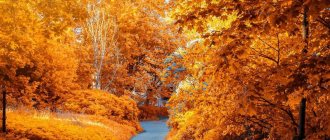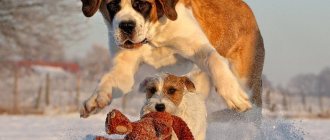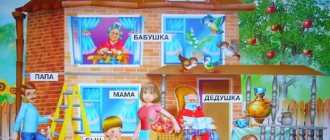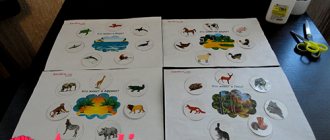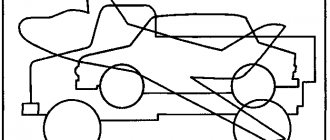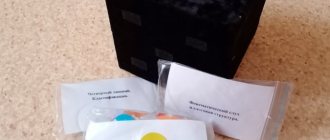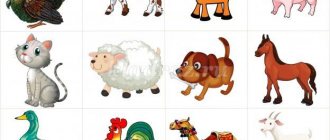Notes on the development of speech in the senior group with mental retardation Notes on the lesson “Pets”
GBDOU kindergarten No. 40
Summary of educational activities for speech development in the senior group with mental retardation
Lesson summary "Pets"
Compiled by: Krivtsova N.A.
Program content: -Consolidation of ideas about domestic animals and their cubs, their appearance, lifestyle and habits; -Clarification, expansion and activation of the dictionary on the topic “Pets”; -Improving the grammatical structure of speech (the use of nouns with the suffixes –onok-, -enok-; -Formation of skills in the formation of possessive adjectives;
-Exercise in using simple prepositions; -Development of auditory and visual attention, thinking, -Enrichment of children's vocabulary; -Formation of skills of cooperation, mutual understanding, goodwill, initiative, responsibility; - Fostering love and respect for pets; Equipment: Typesetting cloth, tape recorder, disc with recordings of the voices of domestic animals and their cubs, masks - caps, envelopes with cut-out pictures; subject pictures depicting domestic animals and their cubs, the painting “Animal Farm”. Preliminary work: - Conversation about the benefits of pets; -Learning the finger game “Cubs”; -Formation of concepts: “stable”, “pig sty”, “cowshed”, “sheepfold” in individual lessons. GCD move:
Organizational point: Relaxation exercise “Sunny Bunny”
Imagine that a sunbeam looks into your eyes. Close them. It ran further down the face. Gently stroke it with your palms: on the forehead, on the nose, on the mouth, on the cheeks, on the chin. Stroke gently so as not to frighten the head, neck, tummy, arms, legs. He climbed up the collar - pet him there too. He is not a mischievous person - he catches and caresses you, and you pet him and make friends with him (repeat 2-3 times).
Main part: The teacher invites the children to take a seat at the table, turns on the tape recorder (the recording of “Animal Voices” plays). -Where have we been? What did you hear there? (children answer) -List the animals whose voices we heard (children answer). -That's right, we heard the voices of a cow, horse, sheep, pig, dog, cat.
- Let us turn into domestic animals and imitate their voices.
(The teacher hands out animal masks, and the children imitate the voices of their animal, and then repeat it all together.) -I think you have already guessed that today we will talk about domestic animals, what they look like, what benefits they bring to humans, how people care for them. A conversation about pets based on the picture “Animal Farm”. -What can you call them all? -Why are they called pets? -Tell me what animals have? -What is the body covered with? —Where do pets live? -Why? -People look after them, build houses, take care of them, because they are useful. Game “Find the Animals” Development of visual attention, improvement of the grammatical structure of speech (use of simple prepositions). — Children, pay attention to the fact that all pets are very sad. Do you know why? -Because they lost their cubs.
Name the Baby Ball Game - Look around and help pets find their babies. -When you find your animal’s baby, take the figurine and go to your places. -Now tell me about where the cubs were hiding. -The calf was hiding behind a tree. -The lamb hid on the bridge. -The kid hid behind a bush. -The rabbit was sitting in a box. -Place the animal figurines and their babies on the table. Game “Collect a picture and tell about the animal using a mnemonic table” Development of visual gnosis-constructive praxis, thinking, fine motor skills of the hands. Expansion and clarification of the dictionary on the topic: “Pets” (children are offered an envelope with a cut picture, consisting of 5-6 parts). - Guys, take out the parts of the cut picture from the envelopes. You need to collect the whole picture. -And the pictures of pets on the board will be clues for you. -You completed the task correctly. Fold the cut pictures into envelopes. -And now we’ll rest and do some finger exercises.
Finger gymnastics “ Cubs” The cubs live in this house. Their mothers call and they immediately run. (naming the young domestic animals, they straighten the fingers on the hand, starting with the thumb) The foal is fast, the kitten is fluffy, the calf is vigorous, the puppy is playful, the kid is horned, all the guys ran away. (all fingers form a fist again)
Game “Who Lives Where?” Exercise in understanding the functions of suffixes in word formation. -We already know how a person cares for domestic animals: feeds them, builds dwellings (houses). Each dwelling has its own name. The horses live in the stable. Cows live in a barn. Pigs live in a pigsty. -Show me who lives where. -Who lives in a pigsty, etc. Physical exercise “Cat” The cat came out onto the ledge
The window opened (arms to the sides) and the cat came out onto the ledge. (imitation of the soft, graceful gait of a cat) The cat looked up, (throw back its head, look up) The cat looked down. (lower your head, look down) So you turned to the left, (turn your head to the left) She followed the flies with her gaze. (turn your head to the right, “follow” the fly with your gaze) She stretched, smiled (appropriate movements and facial expressions) and sat down on the ledge.
Result:
Educator: - Well done guys! Let's remember what we did today? What did you like most?
